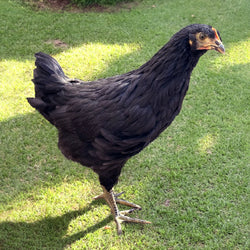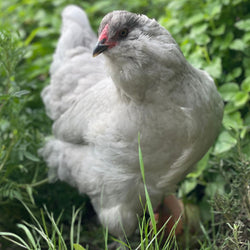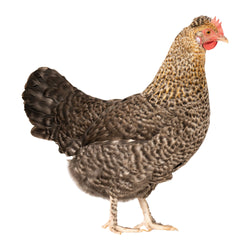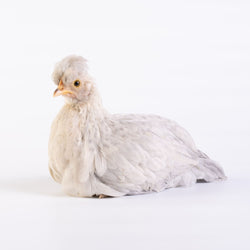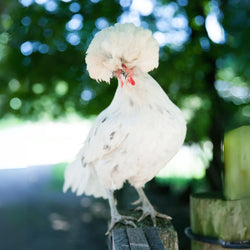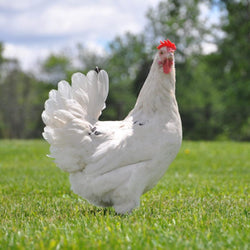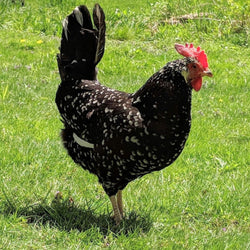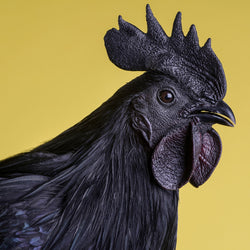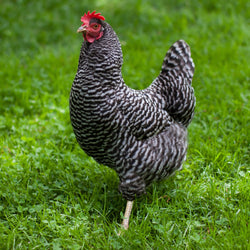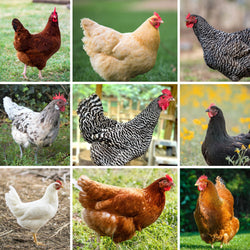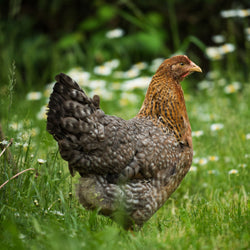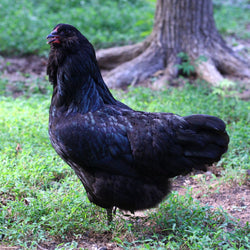page=7/--
Frequently Asked Questions
Here we answer the most commonly-asked questions about ordering, chicken care, and more.
What time of year should I order baby chicks?
Depending on the breeds you want, you may find that there's a wait of six months or more, so we recommend you place your order just as soon as you're sure which breeds you'd like and the approximate time of year you'd like them. Of course, if you're not too picky about breeds, we usually have some availability for the next week's hatch! As to what time of year is best to receive baby chicks, we can offer some advice. Spring and early summer are historically the most popular times to receive baby chicks, for two basic reasons. First, female...
Read MoreCan hens REALLY crow?
Yes! It's not even that rare, either! In all-female flocks, or flocks in which the ratio of females to males is greater than 10:1, in many cases one female will take on male characteristics and become the "protector" of the rest of the flock. In addition to coming out with a half-crow, she'll usually cease laying, and she may even develop spurs to rival a male's. Strange, but true!
Read MoreHow do you tell if a baby chick is female or male?
If you have a "sex link" chick, it's easy! Males and females hatch out different colors. Red Stars are a very common sex link, and the females are a reddish-gold while the males are a buttery color. With "Black Stars", both males and females hatch out black, but males have a distinctive white spot on their head. Cream Legbars are also autosexing: females are dark, and males are paler with a head spot. If you DON'T have an autosexing breed, though, you probably won't be able to tell until the birds are three months old or so. Chicks don't have...
Read MoreWhat if my chick package is late?
Please notify us Thursday if your package has not arrived by then--but do not notify us before Thursday. The US postal service is very good about handling baby chick deliveries, and they are rarely late! In fact, we only have losses about 1% of the time. A package is late only if it does not arrive by Thursday afternoon. If your package has not arrived by then, its tracking number will have been associated with the individual orders in the hatching facility's system, so on Thursday we will be able to track down individual packages should there be the rare...
Read MoreHow do brown eggs become brown (instead of white)?
The brown color in an egg is laid on in the chicken's reproductive tract by the shell gland pouch. Some breeds lay a tinted egg with a very light brown color, while others lay extremely dark chocolate brown eggs. From right to left: Marans egg, Welsummer egg, Rhode Island Red egg. Within a breed, too, hens can lay eggs darker or lighter than the average, depending on whether they produce more or less of the brown color that goes on the shell--and how long the egg stays in the "paint station" of the reproductive tract. Interestingly, individual hens--while they lay...
Read MoreIs there any nutritional difference between white, brown, green and blue eggs?
We like them all, Sam-I-Am! No, there is no difference in terms of edibility, health, or nutrition in different-colored egg shells. That said, the colorful eggs from your backyard hens WILL have much more nutrition, because eggs produced by hens raised on pasture are much healthier, indeed (and they taste much better, too). Keep in mind that commercially produced "free range" eggs may have been laid by hens who have never seen a blade of grass, the sun or the sky. "Pasture-raised" is something different, and much healthier. Eggs laid by hens raised on pasture have less fat and cholesterol,...
Read MoreAt what age does a rooster grow spurs?
This varies widely from breed to breed, and in fact the hens of many breeds even grow small spurs! Some can appear as soon as three months, while others take seven or eight months to develop.
Read MoreWhen do chickens start laying eggs?
On average, chickens start laying eggs at 6 months old, depending on the breed. Breeds like Australorps, Leghorns, Golden Comets and Sex Links will start laying as soon as 16-18 weeks. Larger, heavier breeds like Wyandottes, Plymouth Rocks and Orpingtons will lay anywhere from 6 to 8 months. However, if your birds come into maturity in the fall or winter will sometimes not begin laying until spring: six months is just the average! (We guarantee you that every day past five months that they haven't begun to lay will seem like an eternity!) If your bird is older than eight...
Read More







"The Clubhouse" Coop
Easy to assemble and built to last, the Clubhouse Coop is the perfect starter coop for a small flock.
